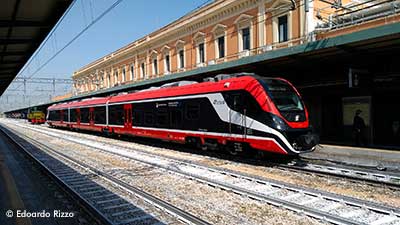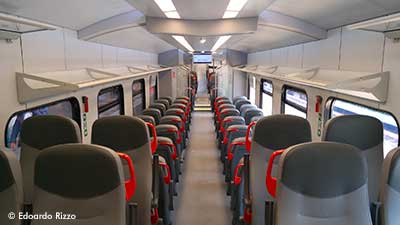Ferrovie del Sud Est: the first electric train is on its way
Taking to the tracks from mid-September, it will mark a green turn on the Bari-Putignano line. The total investment is 70 million

The first electric traction train for Ferrovie del Sud Est on the completely-renewed tracks of the Bari-Putignano (via Casamassima) line. It will be possible to board from mid-September, with the beginning of the winter schedule. Presented this morning in Bari by the Regional Councillor for Transport, Giovanni Giannini, the Mayor of Bari, Antonio Decaro and the CEO of Ferrovie del Sud Est, Luigi Lenci, it is part of the fleet of 18 latest-generation trains that will gradually replace the diesel trains currently in circulation, bringing advantages in terms of efficiency, environmental quality and comfort when travelling.
The new ETR train is 59 metres in length and consists of three modules, able to travel at a maximum speed of 120 km/h. Designed according to modern safety, comfort and accessibility standards, it has 175 seats, including two places for mobility-restricted passengers, four bicycle carriers, one bathroom and large shelves for luggage. Amongst the services aboard: internal LED-lit information displays, mobile platforms to facilitate access for people with reduced mobility, a video surveillance system, air conditioning and sound system.

Ferrovie del Sud Est will commence the first runs by mid-June, in preparation for the commercial service. This result is possible thanks to the radical renewal of 48 kilometres of the line (tracks, ballast and sleepers) and the restoration of the electrification. Works continued for a year. Operating 24 hours a day, seven days a week, they employed 75 technicians including FSE and contractor staff, along with 25 machines.
Within the next year, the Bari-Putignano (via Casamassima) stretch will be also equipped with the Sistema di Controllo Marcia Treno (SCMT - the Train Speed Control System) and 17 level crossings will be entirely automated. The technological upgrade shall render it possible to exceed the speed limit by 50 kilometres per hour, reducing current travel times by 40%.
A modern and green turn on the Bari-Putignano (via Casamassima) line that was the epitome of neglect until a few years ago. The total investment to renew the fleet is 70 million euro.